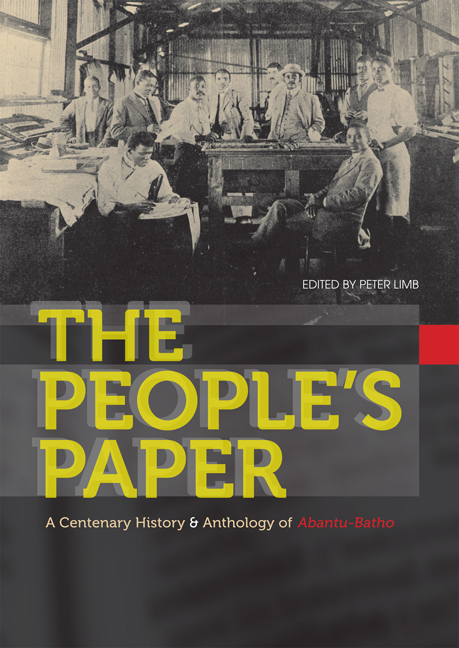Book contents
- Frontmatter
- Contents
- Contributors
- Acknowledgements
- Preface
- List of Abbreviations and Acronyms
- List of Illustrations
- PART I Essays
- Overview
- FOUNDERS AND EDITORS
- THEMES AND CONNECTIONS
- Chapter 6 The Swazi Royalty and the Founding of Abantu-Batho in a Regional Context
- Chapter 7 Abantu-Batho and the Xhosa Poets
- Chapter 8 African Royalty, Popular History and Abantu-Batho
- Chapter 9 ‘Johannesburg in Flames’: The 1918 Shilling Campaign, Abantu-Batho and Early African Nationalism in South Africa
- Chapter 10 Garveyism, Abantu-Batho and the Radicalisation of the African National Congress during the 1920s
- Chapter 11 An African Newspaper in Central Johannesburg: The Journalistic and Associational Context of Abantu-Batho
- Conclusion: Assessing the Decline and Legacy of Abantu-Batho
- PART II Anthology
Chapter 8 - African Royalty, Popular History and Abantu-Batho
from THEMES AND CONNECTIONS
Published online by Cambridge University Press: 21 April 2018
- Frontmatter
- Contents
- Contributors
- Acknowledgements
- Preface
- List of Abbreviations and Acronyms
- List of Illustrations
- PART I Essays
- Overview
- FOUNDERS AND EDITORS
- THEMES AND CONNECTIONS
- Chapter 6 The Swazi Royalty and the Founding of Abantu-Batho in a Regional Context
- Chapter 7 Abantu-Batho and the Xhosa Poets
- Chapter 8 African Royalty, Popular History and Abantu-Batho
- Chapter 9 ‘Johannesburg in Flames’: The 1918 Shilling Campaign, Abantu-Batho and Early African Nationalism in South Africa
- Chapter 10 Garveyism, Abantu-Batho and the Radicalisation of the African National Congress during the 1920s
- Chapter 11 An African Newspaper in Central Johannesburg: The Journalistic and Associational Context of Abantu-Batho
- Conclusion: Assessing the Decline and Legacy of Abantu-Batho
- PART II Anthology
Summary
The African press in the twentieth century played a crucial role in enunciating positive images of African royalty after the destruction of indigenous kingdoms across South Africa by British imperialism and settler colonialism in the previous century. In doing so, newspapers such as Abantu-Batho connected with African oral tradition to help recreate anew an indigenous popular history. The disempowerment of kings and their replacement in some cases by state-appointed ‘chiefs’ made the representation of royalty more complex, but Abantu-Batho in particular sought to maintain the dignity of legitimate kings, while reserving the right to criticise those whom it saw as lacking legitimacy.
There was an almost-organic relationship between African royalties and Abantu- Batho and its key editors active in the South African Native National Congress (SANNC) and/or Transvaal Native Congress (TNC). The founding of the weekly was due in no small part to the support, financial and otherwise, of Queen Regent Labotsibeni of Swaziland, and the ongoing support of her and Prince Malunge was important to its early survival. Such support was reciprocated. A series of articles over its first few years of publication sympathetically explored the predicament faced by Swaziland's indigenous rulers and opposed the country's incorporation into the Union of South Africa. In 1915 the paper called for ‘just recognition [of] Native Kings, Princes and Chiefs under the Supreme Sovereignty of his Majesty the King’. There were articles on connections between rulers and indigenous knowledge. Early in 1916, editor Robert Grendon, announcing in Abantu-Batho that the future King Sobhuza was proceeding to Lovedale, mentions a royal indaba to invoke ‘the blessing and the protection of the Ancestral Spirits (emadhlozi)’. Above all, the paper asserted African dignity. The following month, Grendon reported, in very respectful style, the arrival of Prince Bhuza (the future Sobhuza II) in Johannesburg, where he was feted (at great expense) by another Abantu- Batho editor, Cleopas Kunene. The fact that ‘all the white [British] chiefs from Swaziland accompanied their chief’ was a salutary lesson that Swaziland must not ‘fall under the Union’ for then ‘his royalty will be taken away’.
- Type
- Chapter
- Information
- The People’s PaperA Centenary History & Anthology of Abantu-Batho, pp. 226 - 254Publisher: Wits University PressPrint publication year: 2012



